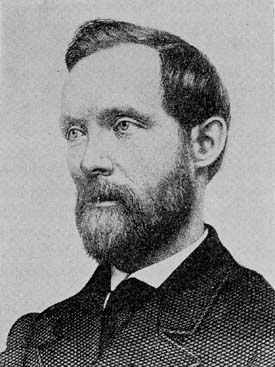
| Home | Information | Contents | Search | Links |
 |
Albert Deane Richardson, journalist and author, was born in Franklin, Massachusetts, October 6, 1833, the son of Elisha Richardson and his second wife, Harriet Blake. He attended the public schools of Franklin, then Holliston Academy, and afterwards taught school for a few terms. In 1851 he went to Pittsburgh where he worked on a newspaper, wrote a farce which was produced by Barney Williams, and himself appeared on the stage a few times. In 1852 he went to Cincinnati where he wrote for the Daily Unionist and various other newspapers for five years.
In April, 1855, he married Mary Louise Pease of Cincinnati, and by her had five children. In 1857 he went to Sumner, Kansas, and acted as correspondent for the Boston Journal. He was secretary to the legislature for a while, and in 1859 accompanied Horace Greeley and Henry Villard to Pike's Peak, then at the height of the gold excitement. He returned by himself through the then rather unknown southwestern territories, and wrote up his travels for the journals. With Thomas W. Knox and George West he edited, in 1860, The Western Mountaineer of Golden City, Colorado. After that he went to New York and was on the staff of the New York Daily Tribune, going for them to New Orleans as secret correspondent to report on the conditions in the South just before the Civil War. The next year he was their chief war correspondent, and on the third of May, 1863, with two other reporters, he attempted to run the Confederate batteries at Vicksburg but was captured and spent a year and a half in Confederate prisons. On December 18, 1864, he and one of the other correspondents escaped from the Salisbury, N. C., prison, and four weeks later reached Strawberry Plains, Tennessee, and the Union lines. During his imprisonment his wife and infant daughter had died in Massachusetts. In 1865 "The Secret Service, the Field, the Dungeon and the Escape" was published, and in 1866 "Beyond the Mississippi," an unusually well written and interesting description of the western territories. In 1868 "A Personal History of Ulysses S. Grant" appeared. In 1867 he became acquainted with Abby Sage (Mrs. Daniel McFarland),(1) and his attentions to her, after she had separated from her husband, led the latter to attempt to kill him, March 13, 1869. Mrs. McFarland obtained a divorce October 31, 1869, and upon learning of this McFarland, on the 25th of November, 1869, shut Richardson in the Tribune office. Richardson died a week later, but a few days before his death on the second of December, 1869, he was united in marriage to Mrs. McFarland by the Rev. Hen Ward Beecher. McFarland, after a trial lasted about eight weeks, was, on May 10, 1870, acquitted of murder on the grounds of insanity, although the evidence seemed to show that the murder was premeditated. After his death, Abby Sage Richardson published a book entitled "Garnered Sheaves from the writings of Albert D. Richardson," which contains a memoir and a portrait.
An excerpt from "Beyond the Mississippi" is given in Vol. I, page 22.
REFERENCES: Appleton's Enc. Amer. Biog., V, 1888, 240-41; Abby Sage Richardson, memorial in Garnered Sheaves, Hartford, 1871, with portrait; A. R. Cazauran, The Trial of Daniel McFarland, 1870, 225 pp.; "The Richardson-McFarland Tragedy," New York Daily Tribune, November 26 to December 6, 1869, and April 5 to May 13, 1870; Police Gazette, 1869; "McFarland Trial," New York Sun, April 6 to May 11, 1870; Edward Van Every, The Sins of New York, New York, 1930, 103-23.
Beadle's Monthly
I Our New States and Territories. Colorado, 1866
II Ibid. Utah, 1866
II Ibid. Nevada and California, 1866
II Ibid. Oregon and Washington, 1866
II Ibid. Montana and Idaho, 1866
Fifty Cent Books Our New States and Territories, 1866
Notes
| 1 | Abby Sage had been a school teacher in Manchester, N. H, and a writer of children's books. She had also been an actress and a writer of plays, and in 1889 wrote the stage version of Mark Twain's "The Prince and the Pauper," which was produced by Daniel Frohman. |